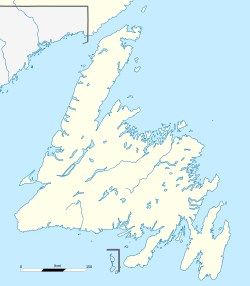Logy Bay-Middle Cove-Outer Cove
| Logy Bay–Middle Cove–Outer Cove | ||
|---|---|---|
| Town | ||

Outer Cove
|
||
|
||
| Location of Logy Bay–Middle Cove–Outer Cove in Newfoundland | ||
| Coordinates: 47°37′27″N 52°39′51″W / 47.62417°N 52.66417°W | ||
| Country |
|
|
| Province |
|
|
| Settled | 1818 | |
| Government | ||
| • Mayor | John Kennedy | |
| Area | ||
| • Total | 16.98 km2 (6.56 sq mi) | |
| Population (2006) | ||
| • Total | 1,978 | |
| • Density | 116.5/km2 (302/sq mi) | |
| Time zone | Newfoundland Time (UTC-3:30) | |
| • Summer (DST) | Newfoundland Daylight (UTC-2:30) | |
| Area code(s) | 709 | |
Logy Bay–Middle Cove–Outer Cove is a town in the Canadian province of Newfoundland and Labrador. Located about 10 minutes' drive outside of the city of St. John's and adjacent to the Town of Torbay on the eastern tip of the Avalon Peninsula.
The area encompassing Logy Bay–Middle Cove–Outer Cove was within the boundaries of lands granted to the London and Bristol Company in 1610. In 1627, the company experienced financial difficulties and evidently made lands available to private groups. The name Logy Bay itself first appears on Southwood's map of = 1675, however, permanent settlement did not begin until the early 19th century. The earliest record of settlement in Logy Bay is from 1818 when Luke Ryan, a fisherman, sought permission to build a fishing room. The earliest records of settlement in Outer Cove and Middle Cove appear around 1827, but occupation here most likely predated this year.
The early settlers of Logy Bay–Middle Cove–Outer Cove were immigrants predominantly from the Irish counties of Kilkenny, Waterford, Wexford, and Cork. In particular, the town of Inistioge in Kilkenny was the origin of most of the pioneers of Logy Bay. These early settlers were attracted to the area by the easy access to the excellent fishing grounds that lay just offshore and by the good farmland that dotted the region.
Between 1827 and 1830 there were 9 petitions for land in Logy Bay, 3 in Middle Cove and 30 in Outer Cove. By the 1850s, the Irish had established themselves and proceeded to shape the landscape. Irish heritage is still strong today and can be seen in such things as religion, folkways, music, and dialect.
...
Wikipedia


